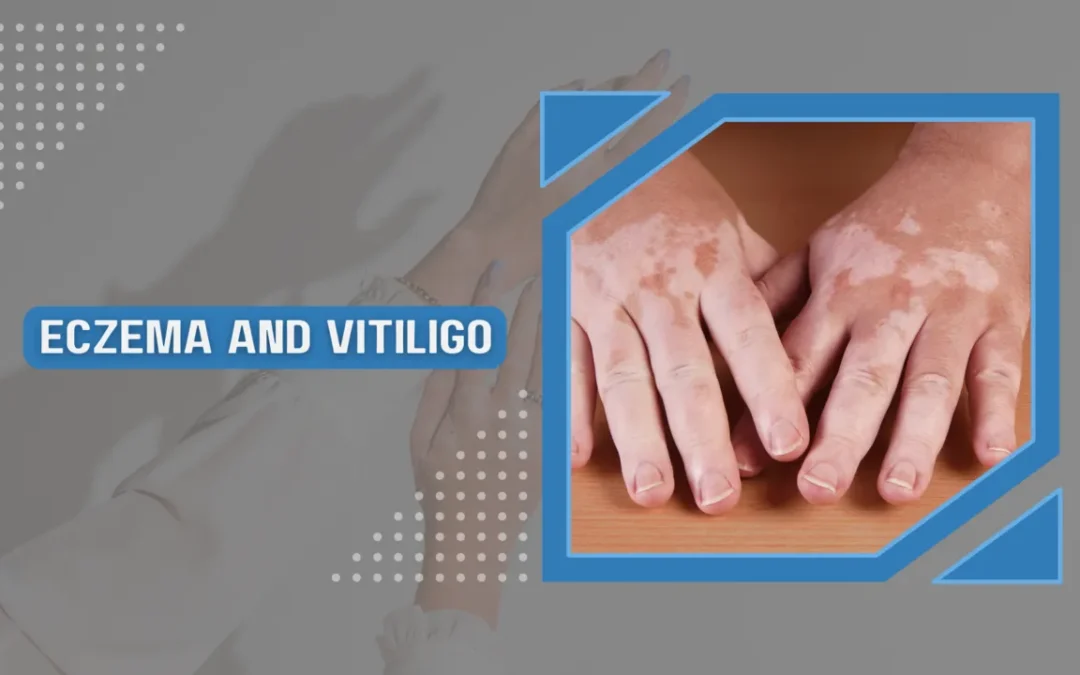Living with skin disorders such as eczema and vitiligo can be a stressful experience. It affects not only physical comfort but also emotional well-being. Itching, redness, and discoloration can hurt one’s self-esteem and confidence.
This blog aims to support individuals in navigating these skin conditions with resilience and positivity through education, acceptance, and effective management strategies.
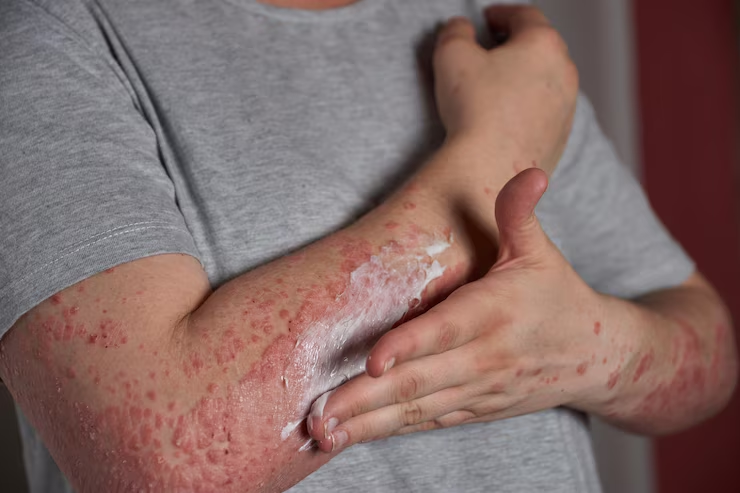
Dr. Archit Aggarwal is a renowned dermatologist in Faridabad. He offers not just medical advice but a warm approach and wide skills. Dr. Aggarwal understands the complexities of eczema and vitiligo well. He works with patients to customize treatments that fit their skin and goals.
Take the first step towards healthier skin and improved well-being. Schedule a consultation with an expert today!
Understanding Eczema and Vitiligo:
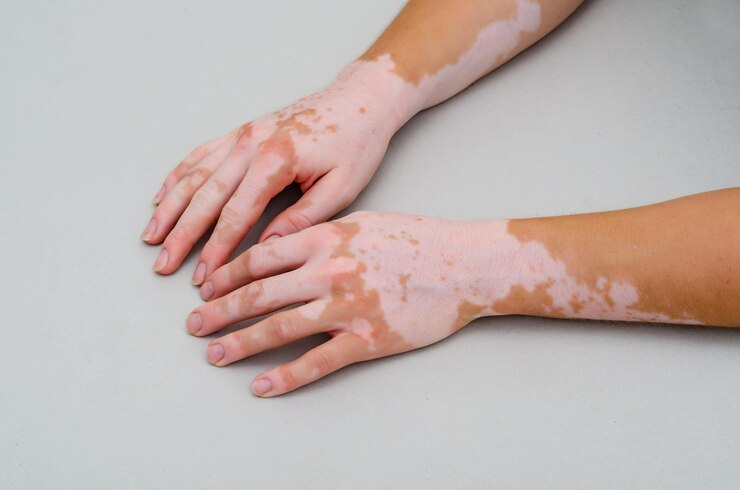
Eczema, or atopic dermatitis, is a chronic skin condition. It appears as red, itchy, and inflamed white patches on the skin. These patches can vary in size and severity. They often cause much discomfort and irritation. People with eczema may have flare-ups. It can get triggered by many things, like allergens such as pollen, pet dander, or certain foods. Also by irritants like harsh soaps or fabrics. Stress and hormonal changes can worsen eczema symptoms.
Dr Archit Aggarwal states, “Eczema is common in people with a family history of allergies, asthma, or hay fever. This suggests a genetic tendency to the condition.” He further adds, “The exact cause of eczema is unknown. But, it is thought to result from a mix of hereditary and environmental factors.”
Vitiligo appears as white patches on the skin. This is due to the loss of melanocytes, which produce pigment. These patches can appear anywhere on the body and may enlarge or spread with time. Vitiligo is thought to be caused by the immune system. It attacks and destroys melanocytes. People with a family history of vitiligo are more likely to get it. It is also influenced by genetics. Furthermore, oxidative stress, chemical exposure, or skin trauma can add to vitiligo.
Difference between Eczema and Vitiligo:
This table gives a short comparison between eczema and vitiligo. It highlights their differences in symptoms, triggers, causes, affected areas, and treatments.
| Feature | Eczema | Vitiligo |
| Definition | Chronic inflammatory skin condition | Skin disorder characterized by loss of pigment |
| Symptoms | Red, itchy, inflamed patches of skin | White patches on the skin due to pigment loss |
| Triggers | Allergens, irritants, stress, hormonal changes | Autoimmune factors, genetic predispositions, oxidative stress |
| Cause | Combination of genetic predispositions and environmental triggers | Autoimmune disorders, genetic predispositions, oxidative stress |
| Affected Areas | Hands, arms, behind knees, face | Can occur anywhere on the body, often spreading over time |
| Treatment | Moisturizers, topical corticosteroids, trigger avoidance, stress management | Topical corticosteroids, calcineurin inhibitors, phototherapy, surgical procedures |
Don’t let eczema or vitiligo hold you back. Book your appointment and take proactive steps towards better skin health.
What are the causes of eczema and vitiligo?
Causes of Eczema :
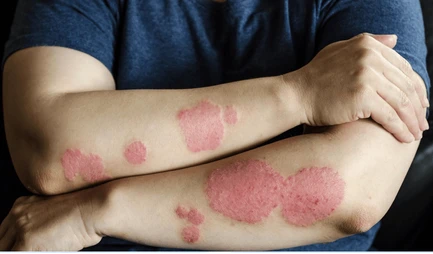
Skin Barrier Dysfunction:
Eczema patients often have a damaged skin barrier. This lets irritants and allergens in more easily and causes irritated skin.
Immune System Dysregulation:
Immune system abnormalities can contribute to the development of eczema. It results in an increased inflammatory response in the skin.
Microbial Factors:
Imbalances in the skin microbiome can cause eczema. They are involved in the overgrowth of certain bacteria or fungi.
Climate & Weather Conditions:
Environmental variables such as dry or cold weather can increase eczema symptoms. They dry out the skin making it more prone to irritation.
Dietary Factors:
Certain dietary factors are linked to eczema symptoms. These factors include dairy products, gluten, and processed foods.
Causes of Vitiligo :
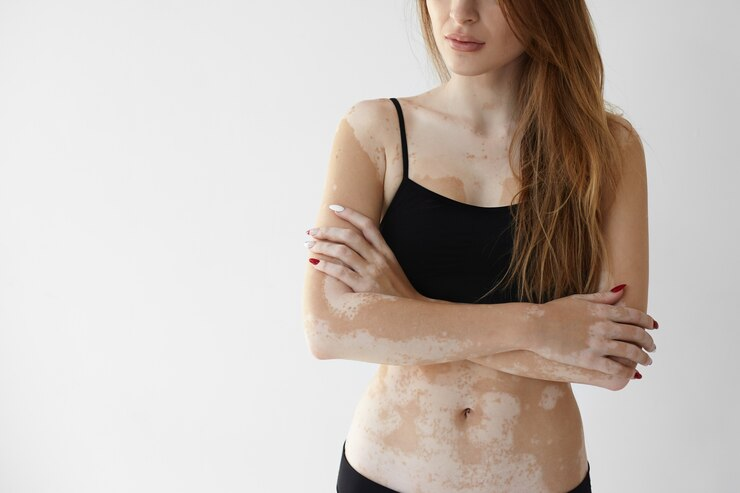
Neurogenic Factors:
Nerve injury or dysfunction can alter signals between nerve terminals and melanocytes. This leads to the formation of vitiligo patches.
Endocrine Factors:
Thyroid diseases or sex hormone fluctuations might affect melanocyte activity. This might contribute to vitiligo development.
Autoantibodies:
The production of autoantibodies against melanocytes may result in consequent depigmentation leading to vitiligo.
Environmental Toxins:
Industrial chemicals, heavy metals, or pollutants can cause vitiligo in sensitive people.
Medication-induced:
Medications such as immunomodulators or chemotherapy can worsen vitiligo.
Explore personalized treatment options for your skin condition. Schedule a consultation with an expert today!
What are the treatments available for eczema and vitiligo?
Eczema
Treating eczema and vitiligo requires a thorough approach. It must adapt to each person’s needs.
Topical corticosteroids are an important part of eczema treatment. They reduce inflammation and itching caused by flare-ups.
Moisturizers, like corticosteroids, serve an important function in keeping skin hydrated. It is necessary for avoiding dryness and limiting irritation. Identifying and avoiding triggers is crucial. These triggers include skin allergens or irritants.
Severe eczema may need oral medicines. Doctors may recommend immunosuppressants or oral corticosteroids to ease symptoms.
Phototherapy also helps. It involves exposure to a specific light that assists in relieving eczema and aids healing.
Vitiligo
Vitiligo treatment focuses on repigmentation therapies. It aims to restore color to depigmented areas.
Doctors use topical steroids and calcineurin inhibitors to enhance pigment synthesis. It also eases repigmentation.
Phototherapy uses ultraviolet A or narrowband ultraviolet B light. It helps repigmentation in vitiligo-affected areas.
In some cases of vitiligo, surgical treatments such as skin grafting or melanocyte transplantation may be considered for repigmentation. These methods involve transferring healthy melanocytes from unaffected areas to vitiligo-affected areas, thereby restoring natural skin color.
What are the ways to prevent eczema and vitiligo?
For Eczema:
Skin Hydration: Regularly moisturize the skin to prevent dryness and minimize eczema flare-ups.
Trigger Avoidance: Identify and avoid common triggers. These include stress and allergens (like pollen and pet dander). Also the irritants (like harsh soaps).
Gentle Skincare: Use mild, fragrance-free skin care products to minimize skin irritation and inflammation.
Overall Health: Maintain a balanced diet and manage stress effectively. Get regular exercise to support skin health and immune function.
For Vitiligo :
Sun Protection: Protect the skin from sun exposure by wearing sunscreen and protective clothing. This helps prevent sunburn, which can cause or worsen vitiligo.
Stress Management: Practice stress-reducing techniques. This includes mindfulness, meditation, or yoga to cut stress-induced flare-ups of vitiligo.
Avoid Skin Trauma: Prevent injuries or trauma to the skin, as it may trigger the development of new patches of vitiligo.
Prompt Treatment: Get medical help quickly for any skin changes or abnormalities. It helps in finding and managing vitiligo early.
Regular Skin Checks:
Do routine skin self-checks. Also, report any changes or new patches to a dermatologist for early diagnosis and treatment.
Conclusion:
Finally, eczema and vitiligo require specialized treatment for optimum management. Seeking advice from skin specialists is critical. Dr. Archit Aggarwal, an experienced dermatologist in Faridabad, is a preferred choice for patients seeking proper diagnosis and personalized treatment.
People can improve their lives by spotting triggers and taking steps to prevent them. Working with doctors and self-care makes it easier to manage chronic problems. This leads to healthier and happier skin.
FAQs
Q1. Can Eczema and Vitiligo happen together?
Yes, eczema and vitiligo can occur together in the same individual.
Q2. What triggers eczema?
Eczema can be triggered by a variety of factors, including irritants, allergens, stress, weather changes, and genetic predisposition.
Q3. Can eczema leave dark patches?
In some cases, eczema can leave behind dark patches, especially after prolonged inflammation or scratching.
Q4. Does vitiligo start with itching?
Vitiligo typically does not start with itching; however, itching may occur as the condition progresses.
Q5. Do white spots from eczema go away?
White spots caused by eczema can fade over time, but complete resolution may not always occur.

